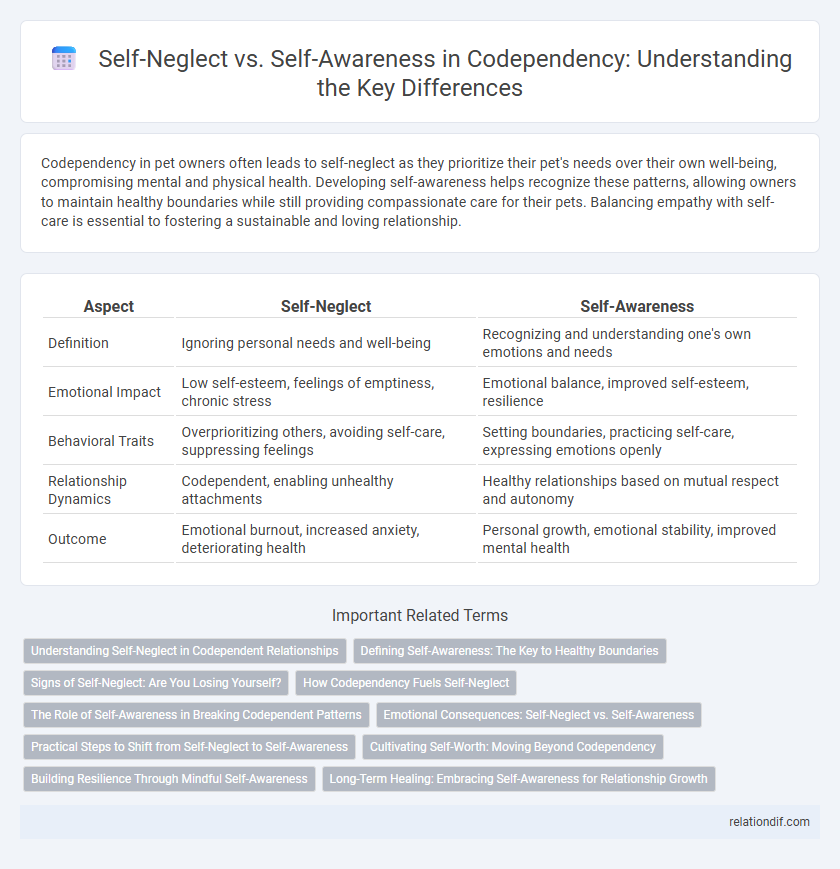Codependency in pet owners often leads to self-neglect as they prioritize their pet's needs over their own well-being, compromising mental and physical health. Developing self-awareness helps recognize these patterns, allowing owners to maintain healthy boundaries while still providing compassionate care for their pets. Balancing empathy with self-care is essential to fostering a sustainable and loving relationship.
Table of Comparison
| Aspect | Self-Neglect | Self-Awareness |
|---|---|---|
| Definition | Ignoring personal needs and well-being | Recognizing and understanding one's own emotions and needs |
| Emotional Impact | Low self-esteem, feelings of emptiness, chronic stress | Emotional balance, improved self-esteem, resilience |
| Behavioral Traits | Overprioritizing others, avoiding self-care, suppressing feelings | Setting boundaries, practicing self-care, expressing emotions openly |
| Relationship Dynamics | Codependent, enabling unhealthy attachments | Healthy relationships based on mutual respect and autonomy |
| Outcome | Emotional burnout, increased anxiety, deteriorating health | Personal growth, emotional stability, improved mental health |
Understanding Self-Neglect in Codependent Relationships
Self-neglect in codependent relationships manifests as prioritizing others' needs at the expense of one's own physical, emotional, and mental well-being, often leading to exhaustion and diminished self-worth. Understanding self-neglect involves recognizing patterns of boundary erosion, chronic people-pleasing, and neglecting personal goals or health. Cultivating self-awareness helps individuals identify these harmful behaviors early, fostering healthier boundaries and promoting emotional resilience.
Defining Self-Awareness: The Key to Healthy Boundaries
Self-awareness serves as the foundation for establishing healthy boundaries by enabling individuals to recognize their own needs, emotions, and limits without dismissing their well-being. Unlike self-neglect, where personal needs are often ignored to prioritize others, self-awareness promotes mindful reflection and honest assessment of one's feelings, fostering resilience and balanced relationships. Developing self-awareness is crucial in codependency recovery as it empowers individuals to prioritize self-care while maintaining empathy and connection with others.
Signs of Self-Neglect: Are You Losing Yourself?
Signs of self-neglect in codependency include chronic exhaustion, neglecting personal needs, and constant prioritization of others over oneself. Emotional symptoms often manifest as low self-esteem, feelings of emptiness, and a lack of personal boundaries. Recognizing these signs is crucial for rebuilding self-awareness and restoring a healthy sense of identity.
How Codependency Fuels Self-Neglect
Codependency fuels self-neglect by prioritizing others' needs over personal well-being, often causing individuals to ignore their own emotional and physical health. This imbalance disrupts self-awareness, making it difficult to recognize personal boundaries and self-care requirements. Over time, the erosion of self-awareness perpetuates a cycle of neglect, reinforcing codependent behaviors and diminishing overall mental wellness.
The Role of Self-Awareness in Breaking Codependent Patterns
Self-awareness is crucial in breaking codependent patterns by helping individuals recognize their own needs and boundaries, which are often neglected in codependent relationships. Developing self-awareness enables a shift from self-neglect to self-care, fostering emotional independence and healthier interpersonal dynamics. This conscious understanding allows for the identification of unhealthy behaviors and promotes intentional, balanced interactions.
Emotional Consequences: Self-Neglect vs. Self-Awareness
Self-neglect in codependency often leads to emotional exhaustion, increased anxiety, and diminished self-worth due to the suppression of personal needs and emotions. In contrast, cultivating self-awareness promotes emotional resilience, healthier boundaries, and a stronger sense of identity by recognizing and validating one's feelings. This shift from self-neglect to self-awareness is crucial for breaking codependent patterns and fostering emotional well-being.
Practical Steps to Shift from Self-Neglect to Self-Awareness
Recognizing patterns of self-neglect is essential for developing self-awareness in codependency recovery, as failing to meet one's own needs often perpetuates unhealthy relational dynamics. Practical steps include setting clear personal boundaries, practicing daily mindfulness to identify emotional and physical needs, and engaging in regular self-care routines such as journaling or therapy sessions. Cultivating self-awareness enables individuals to prioritize their well-being, make conscious choices, and foster healthier, more balanced relationships.
Cultivating Self-Worth: Moving Beyond Codependency
Cultivating self-worth requires shifting from self-neglect, a common symptom of codependency, to active self-awareness that honors personal needs and boundaries. Prioritizing emotional health fosters resilience and empowers individuals to form healthier relationships based on mutual respect rather than approval-seeking behaviors. Practicing consistent self-care and affirmations rebuilds intrinsic value, breaking the cycle of codependent patterns and enabling authentic self-expression.
Building Resilience Through Mindful Self-Awareness
Building resilience through mindful self-awareness involves recognizing personal needs and setting healthy boundaries, which counters the tendency of self-neglect common in codependency. Developing this awareness fosters emotional regulation and strengthens the ability to respond to stress without losing one's sense of self. Consistent practice of mindful self-awareness leads to improved mental health and sustainable personal growth by prioritizing self-care and self-compassion.
Long-Term Healing: Embracing Self-Awareness for Relationship Growth
Long-term healing in codependency hinges on cultivating self-awareness rather than succumbing to self-neglect, allowing individuals to recognize their own needs and boundaries within relationships. Embracing self-awareness promotes emotional resilience and healthier dynamics, ultimately fostering mutual respect and personal growth. Consistent practice of mindfulness and reflective journaling strengthens this awareness, enabling sustained transformation and deeper connection.
self-neglect vs self-awareness Infographic

 relationdif.com
relationdif.com